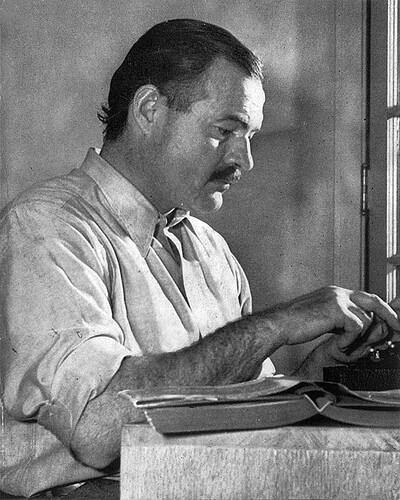Since the beginning of the year I have a new tool: the Hemingway App.
It is a dead simple word processor, but it is unique in that it nudges you to write like Ernest Hemingway. This means:
- Short sentences
- Simple words. Example: replace "participate" with "take part".
- Few or no adverbs. They are "kryptonite for verbs". Replace your verb with a more forceful one and kill the adverb.
- Few or no passive forms.
The idea is getting your reader to focus on your message, not your prose.
Here’s the clever bit: Hemingway dispenses its advice in real time. When your sentence becomes too long, bang! It becomes highlighted in red. You want the red to go away, so you rethink the sentence and break it down. At the end, you have simpler, clearer writing.
Native speakers of romance languages, like Italian or French, are seldom fans of this style. We like clarity, sure, but terse writing seems a little… inconsiderate. Yet, I submit that Hemingway’s style is great for online debate. Edgeryders is a good case in point. We write to interact with others; if we do it well, many people end up reading what we write. The potential for wasting people’s time in struggling with unclear phrasing is large.
The math is simple. A good post in Edgeryders gets 100-200 readers. A top-notch one gets 400-600. Suppose you reword your post and manage to make your reading time go down by one minute. Congratulations! You just saved the community 2 to 10 hours of reading time.
You might ask: what about subtlety? We use adverbs to attenuate our meaning. This is typical of academic writing: academics are not supposed to write “X is true”, but “X is (generally/likely) true”.
At Edgeryders, we believe open conversation is an engine of collective intelligence. The operative word here is “collective”. The best contributors are those who create the most opportunities for others to contribute. A great way to make space for others is to make one’s statements vulnerable to falsification. If I say “X may be true”, I can never be wrong, even if X is false. I covered my individual back. We as a collective pay the price, because many people do not engage with non-falsifiable statements. And we know from Karl Popper’s work that there is no way to make progress outside falsification. The collective smarts of a group comes down to its protocol for disagreeing.
The Hemingway App encourages clarity. A clear statement is more falsifiable. A group that communicates with clarity will have more collective smart than one that does not. By the same token, clarity entails a risk for the communicator. If you are clear and you make a mistake, someone is bound to notice and call you out on it. If you make mistakes, even many deliberate ones, and shroud them in bullshit, you’ll get away with it. Alan Sokal’s famous hoax showed it.
I have decided clarity works for me. I accept the individual risk. What I get in return is the opportunity to be part of a smart group, that learns faster because its members are not afraid of making mistakes in public. So, Hemingway App it is for me. This very post was written with it. Now I am sharing this tip with you in the hope it is useful to you, too.
You can try it here. After some use, I bought the desktop version for ten dollars.
